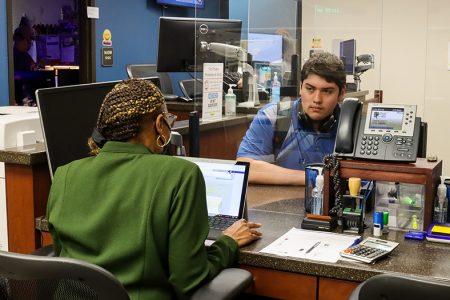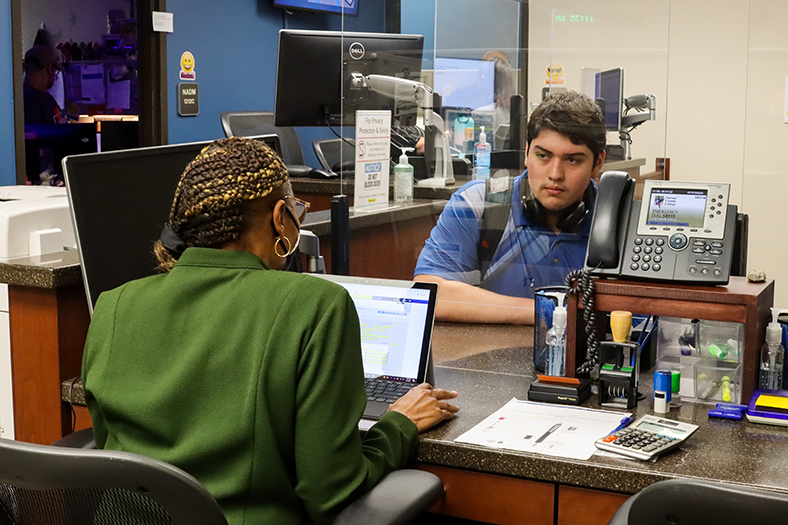
information to NE student Michael Villegas.
Ariel Desantiago/The Collegian
ALEX HOBEN
editor-in-chief
alexandra.hoben@my.tccd.edu
The U.S. government says it will forgive $10,000 of student loan debt and $20,000 for Pell Grant recipients.
On Aug. 24, President Joe Biden outlined the details of this new plan. He spoke about how the cost of schooling has nearly tripled in the past 40 years. He outlined the three-part system that he worked on with Secretary of Education Miguel Cardona.
“Here’s what my administration is going to do: provide more breathing room for people so they have less burden by student debt and, quite frankly, to fix the system itself, which we came in and we both acknowledged was broken,” Biden said.
Individual borrowers who make $125,000 or less per year qualify and for married couples it is $250,000. According to Biden, these cancellations were made with the thought of low-income students in mind.
“Both of these targeted actions are for families who need it the most — working and middle-class people hit especially hard during the pandemic making under $125,000 a year,” Biden said. “You make more than that, you don’t qualify.”
Also in the plan is an extension of the payment pause to Dec. 31, cutting monthly payments, lowering the price of college tuition and monitoring the institutions to prevent price hiking in the future. Biden expressed his hope for what this will do for students in debt.
“All of this means people can start to finally crawl out from under that mountain of debt to get on top of their rent and their utilities,” he said. “To finally think about buying a home or starting a family or starting a business.”
Currently, there is a total of $1.75 trillion in student loan debt in the U.S. across both federal and private loans.
District director of student financial aid services Samantha Stalnaker believes this will have a positive effect on both TCC and university students.
“Students will be able to complete their TCC or University degrees with less debt and or no debt,” she said. “This will allow students to explore additional opportunities after school. Such as considering graduate school, starting a business, saving for future investments and financial flexibility in career choices.”
Stalnaker said how she believes this plan will help the majority of borrowers, especially after the pandemic. She said how those with outstanding loan debt are struggling and this will seriously affect their lives and future endeavors and opportunities, but there is the potential for change.
“Individuals will be able to pursue small business opportunities, home ownership, and other life enhancing opportunities,” she said.
Stalnaker also said how taking out a student loan isn’t for everyone and the student should weigh the loan against a realistic post-graduate salary expectation.
“Financial literacy and understanding your current and future financial goals are key to making the choice to borrow for your education,” she said.
For SE student Matthew Jewell, this announcement, while it doesn’t affect him personally, was a shock.
“When I first heard about the announcement, I found it to be too good to be true,” he said. “Biden, our current president, has been promising a student loan plan for almost two years, so for it to happen finally surprised me.”
But Jewell is skeptical about the logistics of the proposed method and worries about what it can do to the economy.
“We can only print so much money until inflation, which it already is, becomes a constant problem,” Jewell said.
Universities now are incredibly expensive, and Jewell said people are straying from higher education and looking for other ways to make money.
“The cost of everything, especially education, continues to increase, and I find that it will keep increasing,” Jewell said. “Most people are not eligible for FAFSA, and scholarships are hard to find when you do not know what you are looking for.”
NE student Curtis Patterson was interested to see the updates about the student loan forgiveness plan and is curious how the government will afford it.
“I think it’s interesting to see where that money comes from and how it may inflate other areas,” he said.
Patterson said while he doesn’t currently have any student loans, he can see how they’re unavoidable to attend a university in the future.
“I think they’re unfortunately a necessity for the average person,” he said. “So they are needed for higher education.”

